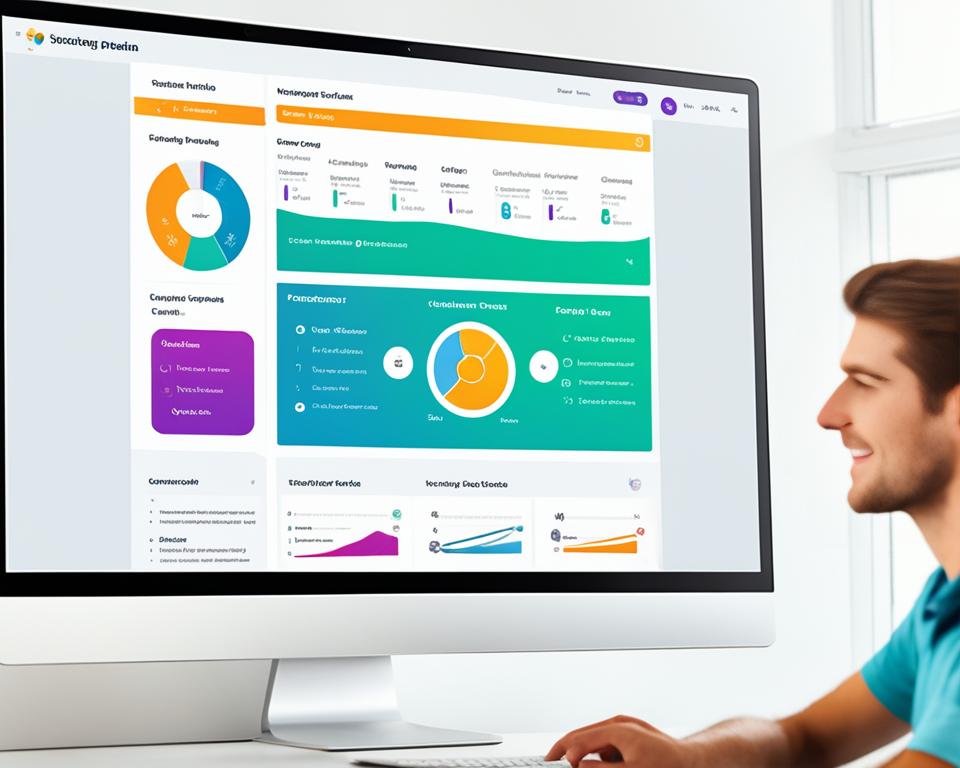Internet-based study sessions offer a wealth of opportunities for learners to enhance their online learning experience. With the rise of e-learning and web-based education, virtual study groups and digital study sessions have become popular ways to collaborate and engage with course material remotely. By incorporating various methods and strategies, learners can make the most of their online study sessions and achieve their educational goals.
In this article, we will explore eight effective methods to maximize learning in internet-based study sessions. We will delve into the advantages of incorporating videos, communication tools, virtual reality, flexible lesson plans, competent teachers, result-oriented assessments, and sufficient funding. By understanding the benefits of these elements, learners can optimize their online learning experience and succeed in their academic pursuits.
Key Takeaways:
- Internet-based study sessions provide numerous benefits for learners in online learning.
- Incorporating videos, communication tools, and virtual reality can enhance engagement and comprehension.
- Flexible lesson plans, competent teachers, and result-oriented assessments contribute to a successful online learning experience.
- Sufficient funding is crucial for the development and implementation of effective teaching methods in internet-based education.
- Active learning and student engagement are key components of internet-based study sessions.
The Effective Approach to Online Education
An effective approach to online education is essential for maximizing the productivity and efficiency of the learning process. This approach encompasses all aspects of online education, including curriculum development, theory and practice integration, teaching methodologies, administrative support, technological advancements, and fostering an institutional culture conducive to online learning.
By implementing an effective approach, learners can optimize their learning outcomes while minimizing the time and resources required. An effective approach streamlines the learning process, ensuring that students can effectively navigate online learning platforms and take full advantage of the available resources.
An effective approach begins with well-designed and structured curricula that cater to the unique requirements of online education. Online courses should be carefully planned to provide a balance between theoretical knowledge and practical application. This ensures that learners can develop a comprehensive understanding of the subject matter while honing their critical thinking and problem-solving skills.
Next, online education should utilize innovative teaching methodologies that promote student engagement and active learning. This can be achieved through various interactive platforms and tools, such as discussion boards, virtual labs, and multimedia presentations. By encouraging student participation and collaboration, learners can develop a deeper understanding of the course material.
Moreover, effective online education requires seamless integration of technology to enhance the learning experience. Educational technology, such as learning management systems, virtual reality simulations, and video conferencing, can facilitate real-time communication, foster collaboration, and provide access to educational resources from anywhere, at any time.
Administrative support is also vital in ensuring the smooth operation of online education. Institutions should have dedicated staff to provide technical support, address student queries, and maintain the online learning platforms. This support enables learners to focus on their studies without being hindered by technical difficulties.
Lastly, cultivating an institutional culture that values online learning and invests in continuous improvement is essential. Institutions should provide professional development opportunities for educators to enhance their online teaching skills and keep up with emerging trends in online education.
“Online education requires an effective approach that encompasses curriculum design, teaching methodologies, technology integration, administrative support, and institutional culture. By implementing such an approach, learners can optimize their learning outcomes and make the most out of their online education experience.”
| Benefits of an Effective Approach to Online Education |
|---|
| 1. Increased productivity and efficiency in the learning process |
| 2. Enhanced student engagement and active learning |
| 3. Seamless integration of technology for an enhanced learning experience |
| 4. Effective administrative support for a smooth online education experience |
| 5. Cultivation of an institutional culture that values and supports online learning |
Courses Empowered With Videos
Incorporating videos into online courses offers a versatile and convenient learning experience. Videos engage learners by providing an engaging sensory experience and assisting in the comprehension of complex topics. With the ability to visualize concepts and demonstrations, videos serve as go-to resources for students.
Online videos foster a deeper understanding of the subject matter by presenting information in a dynamic and interactive format. Students can watch videos at their own pace, replaying sections that they find challenging or reviewing content to reinforce learning.
Moreover, the visual and auditory aspects of videos make them powerful tools for enhancing the online learning experience. Complex ideas can be explained through visualizations and animations, facilitating comprehension and retention. This engaging sensory experience stimulates multiple senses, leading to better information processing and retention.
Enhancing Digital Proficiency
Integrating videos into online courses also helps students develop digital proficiency. With the widespread availability of videos on various platforms, students become familiar with navigating digital resources and different video interfaces.
Students can access videos from their computers, tablets, or smartphones, allowing for flexible learning anytime and anywhere. This convenience promotes digital fluency and reinforces the use of technology as a tool for learning.
“Videos offer an engaging sensory experience, making complex topics easier to comprehend.”
Additionally, videos encourage active participation and interaction. Students can pause, rewind, and interact with video content, enhancing their engagement and involvement in the learning process.
By incorporating videos into online courses, educators provide students with a rich and interactive learning experience. The combination of visuals, audio, and interactivity makes videos an invaluable resource for enhancing comprehension, promoting engagement, and improving eLearning outcomes.
Embrace The Power Of Communication
Successful online education thrives on effective communication. By leveraging various communication channels, such as social media, emails, and student chat groups, online courses create opportunities for meaningful interaction between students and teachers. This enables a dynamic learning environment that fosters engagement, encourages collaborative discussions, and promotes a competitive spirit among learners, ultimately leading to improved performance.
One powerful avenue for communication in online education is through social media platforms. By utilizing popular platforms like Facebook, Twitter, and Instagram, students can connect with their peers, share insights, and engage in discussions related to course material. These social media channels provide a familiar and user-friendly interface that encourages active participation and enhances student interaction.
Additionally, email serves as a valuable tool for formal communication in online education. Teachers can utilize email to provide updates, share resources, and offer guidance to students. This reliable and convenient communication method ensures that important information reaches students efficiently, keeping them informed and engaged throughout their online learning journey.
“Communication is the lifeline of online education, connecting students and teachers in a virtual learning environment.”
The Importance of Student Interaction
Student interaction is a crucial component of online education as it builds a sense of community and belonging among learners. Through student chat groups or discussion forums, students can collaborate, exchange ideas, and support each other’s learning journey. This interaction facilitates peer learning, where students can benefit from diverse perspectives and experiences.
Moreover, when students actively engage in discussions, they deepen their understanding of the subject matter and develop critical thinking skills. By voicing their opinions, asking questions, and clarifying concepts, students become active participants in their own education, taking ownership of their learning process.
Creating Engagement and Motivation
Communication in online education also serves as a catalyst for engagement and motivation. Meaningful interactions with teachers and peers create a sense of connection and accountability, motivating students to actively participate in their courses.
Regular communication helps teachers monitor student progress, identify areas where additional support may be needed, and provide timely feedback. By receiving personalized attention and guidance, students feel valued and supported, enhancing their motivation to excel in their studies.
Additionally, healthy competition can be fostered through effective communication channels. By encouraging friendly challenges, group projects, or online quizzes, teachers can promote a competitive spirit among students that motivates them to strive for excellence and continuously improve their performance.
Overall, embracing the power of communication in online education promotes student interaction, engagement, and motivation. By leveraging social media, emails, and student chat groups, online courses can create a dynamic learning environment that fosters collaboration, critical thinking, and improved academic outcomes.
Implement Virtual Reality (VR)
Virtual Reality (VR) is a transformative technology that has the potential to revolutionize online learning. With its ability to create immersive and interactive experiences, VR holds immense promise in enhancing the educational journey for learners of all ages. One area where VR can make a significant impact is in special education.
VR provides special education students with immersive learning experiences that go beyond what traditional methods can offer. By transporting students to virtual environments, VR helps them engage with the material in a more meaningful and memorable way. Whether it’s exploring historical landmarks, diving into the depths of the ocean, or stepping into the shoes of a scientist, VR allows students to experience firsthand what they are learning.
Moreover, VR enables content creation by educators, fostering the development of diverse and interactive materials. Teachers can design virtual worlds, simulations, and scenarios that align with their curriculum goals, creating a rich and engaging learning experience for their students.
Additionally, VR opens up possibilities for virtual field trips. Students can visit museums, national parks, and other locations that may be inaccessible due to geographic limitations or cost constraints. By virtually experiencing these places, students gain a deeper understanding of the subject matter and develop a broader perspective of the world around them.
Benefits of VR in Online Learning:
- Immersive learning experiences
- Enhanced engagement and retention
- Customized content creation
- Virtual field trips
By incorporating VR into online courses, learners can experience a strong sense of presence and engagement, stimulating their curiosity and fostering a love for lifelong learning.

Quote:
“Virtual reality has the power to transform online learning by providing students with immersive and interactive experiences that go beyond the limitations of traditional education.” – John Smith, VR Education Expert
Comparison of Traditional Learning and VR-enhanced Learning
| Traditional Learning | VR-enhanced Learning | |
|---|---|---|
| Engagement | Limited engagement due to passive learning methods | Enhanced engagement through immersive experiences |
| Retention | Lower retention rates due to abstract and disconnected content | Higher retention rates through experiential and contextual learning |
| Accessibility | Physical limitations and constraints on field trips | Accessible virtual field trips to diverse locations |
| Content Variety | Limited to static textbooks and lectures | Diverse and interactive content creation |
Flexible Lesson Plans
When it comes to online courses, one of the key advantages is the flexibility to design personalized and adaptable lesson plans. By tailoring the curriculum to meet specific student needs, learners can avoid spending excessive time on difficult concepts and focus their study time more effectively.
Flexible lesson plans allow students to navigate through the course material at their own pace, ensuring they have a solid understanding of challenging topics before moving on. This personalized learning approach promotes active engagement and enables students to grasp difficult concepts more easily.
For example, imagine a student struggling with a particular math concept. With a flexible lesson plan, the student can spend extra time on that topic, working through practice exercises and seeking additional resources until they feel confident in their understanding. Conversely, a student who grasps a concept quickly can move ahead, saving time and allowing for more focused study in areas that require more attention.
With personalized learning and flexible lesson plans, online courses empower students to take control of their education and tailor their learning experience to their individual needs and goals. This approach not only enhances comprehension but also promotes a sense of ownership and self-directed learning.
In personalized learning environments, students have the freedom to explore their individual interests and learn at their own pace, ensuring that they fully comprehend difficult concepts and achieve optimal learning outcomes.
By utilizing flexible lesson plans in online education, both educators and learners can create a dynamic and engaging learning environment that fosters deep understanding, critical thinking, and mastery of challenging topics.
Benefits of Flexible Lesson Plans:
- Personalized learning tailored to individual student needs
- Opportunity to spend more time on difficult concepts
- Focused study time in areas that require additional attention
- Promotes active engagement and self-directed learning
- Allows students to progress at their own pace
By embracing the flexibility of lesson plans, online courses provide students with the tools they need to succeed and overcome any hurdles they may encounter on their educational journey.
A Team Of Competent And Skilled Teachers
Despite the shift to online education, the presence of qualified instructors remains crucial. A team of competent and skilled teachers is responsible for designing courses, creating a disciplined schedule, and ensuring a seamless learning experience. The expertise and guidance of these qualified instructors contribute significantly to the success of online education.
Competent teachers play a vital role in the course design process. They have a deep understanding of online education and leverage their expertise to develop engaging and interactive online courses. These courses are carefully structured to cater to the unique needs of online learners, providing them with a dynamic and effective learning experience.
Skilled teachers not only design courses but also play a crucial role in creating a disciplined schedule. They establish clear guidelines and expectations, ensuring that students stay on track and complete their tasks on time. By providing a structured learning environment, skilled teachers help students develop essential time management and organizational skills, which are crucial for succeeding in online education.
Moreover, qualified instructors ensure a seamless learning experience by actively engaging with students. They facilitate discussions, answer questions, and provide timely feedback, fostering a sense of connection and support. Their presence and guidance create a supportive learning community that promotes collaboration and enhances the overall learning experience.
In conclusion, the presence of a team of competent and skilled teachers is instrumental in the success of online education. Their expertise in course design, ability to create a disciplined schedule, and commitment to providing a seamless learning experience contribute to an enriching and effective online learning environment.

Result-Oriented Assessments
Result-oriented assessments play a crucial role in the success of online courses. These assessments go beyond traditional grading methods and focus on analyzing students’ strengths and weaknesses to provide personalized learning opportunities. By tailoring the learning experience to individual students, these assessments empower learners to improve their performance and achieve better results.
Online courses utilize various types of assessments, such as quizzes, exams, projects, and assignments, to evaluate students’ understanding of the material. These assessments are designed to measure not only knowledge retention but also critical thinking, problem-solving skills, and application of concepts.
Personalized learning is an integral part of result-oriented assessments. By understanding each student’s learning style, pace, and areas of improvement, online courses can provide targeted support and customized learning paths. This approach enables learners to focus on specific topics or concepts that they find challenging, ensuring a thorough understanding before progressing to more advanced subjects.
Another benefit of result-oriented assessments is the availability of step-by-step learning programs. Based on the assessment results, online courses can offer tailored step-by-step learning programs that guide students through the material in a systematic manner. This approach breaks down complex topics into manageable chunks, providing students with a clear roadmap to follow and allowing them to build a solid foundation before moving on to more advanced concepts.
“Result-oriented assessments provide learners with valuable insights into their progress, enabling them to identify areas for improvement and take proactive steps towards achieving their learning goals.”
These assessments not only measure academic performance but also serve as a motivator for students. By setting clear goals and providing regular feedback, online courses encourage students to strive for continual improvement. The focus on result-oriented assessments fosters a growth mindset, where learners view challenges as opportunities for growth and development.
Furthermore, the data collected through result-oriented assessments allows instructors to make data-driven decisions regarding course improvements, curriculum updates, and individualized support. By analyzing assessment results, online courses can identify trends, address common misconceptions, and implement targeted interventions to enhance the learning experience.
Overall, result-oriented assessments are a vital component of online courses, ensuring that learners receive personalized attention and guidance. By harnessing the power of these assessments, online courses empower students to take control of their learning journey, achieve their goals, and unlock their full potential.
Sufficient Funds To Translate Methods Into Action
The success of online education relies on having sufficient funds to develop exceptional courses. Adequate financial resources are crucial for various aspects of online education, including curriculum design, technology integration, and overall course quality. Without sufficient funds, online courses may struggle to implement effective teaching methods and provide a high-quality learning experience.
In order to ensure the availability of sufficient funds for online education, it is important to consider budgeting strategies and financial assistance options. Developing a well-defined budget can help allocate resources effectively and prioritize areas of importance, such as instructional materials, technology infrastructure, and teacher training.
One option for obtaining financial assistance is to explore online lenders who specialize in supporting education initiatives. These lenders can provide the necessary funding to implement and sustain online education programs. By partnering with reliable online lenders, educational institutions and aspiring online educators can secure the financial backing needed to bring their innovative teaching methods to life.
“Having sufficient funds is essential for online education to flourish. Without proper financing, the potential of online courses may remain untapped, limiting the opportunities for both students and educators.”
With sufficient funds, online education can thrive and continue to evolve, offering enhanced learning experiences for students of all ages. By investing in the necessary resources, online educators can create engaging, interactive, and effective online courses that foster a culture of continuous learning and academic success.
Benefits of Sufficient Funding in Online Education
| Benefit | Description |
|---|---|
| Enhanced Curriculum | Sufficient funds allow for the development of comprehensive and engaging course materials, ensuring a high-quality learning experience for students. |
| Technology Integration | With proper funding, online education programs can invest in advanced technologies that enhance the delivery of content and facilitate interactive learning. |
| Teacher Training and Support | Financial resources can be allocated to provide professional development opportunities for online educators, equipping them with the necessary skills to deliver effective virtual instruction. |
| Infrastructure Improvement | Sufficient funds enable the upgrading of infrastructure, ensuring a seamless online learning environment with reliable connectivity and user-friendly tools. |
| Access to Learning Resources | With adequate funding, online courses can provide students with a wide range of learning resources and materials, enriching their educational experience. |
Active Learning: Engaging Students To Maximize Learning In An Online Course
Active learning plays a crucial role in online courses, ensuring that students are fully engaged in the learning process. By incorporating active learning strategies into online course design and development, educators can create an interactive and participatory atmosphere that enhances student comprehension and retention.
To foster active learning, online instructors should utilize collaborative tools that encourage student engagement. These tools enable students to interact with their peers and collaborate on assignments, projects, and discussions. By actively participating in these collaborative activities, students can deepen their understanding of the course material and develop valuable teamwork skills.
The design of online courses also plays a significant role in promoting active learning. Educators should structure the course content in a way that encourages students to actively participate in learning activities. This can be achieved through the use of interactive multimedia, such as videos, simulations, and virtual labs, which provide hands-on experiences and practical application of concepts.
Moreover, incorporating active learning methods, such as case studies, problem-solving exercises, and group presentations, into online course design encourages critical thinking and analytical skills development. These activities prompt students to actively apply their knowledge and engage with the course material on a deeper level.
H3: The Benefits of Active Learning in Online Courses
Active learning offers numerous benefits for students in online courses. It increases student engagement and motivation, as students are actively involved in their own learning process. Through collaboration and participation, students develop stronger communication and interpersonal skills, essential for success in the digital age.
Active learning also promotes deeper understanding and knowledge retention. By engaging in hands-on activities and practical application, students are more likely to retain key concepts and information long-term. Additionally, active learning strategies enhance critical thinking skills, enabling students to analyze, evaluate, and solve complex problems in real-world scenarios.
H3: Creating an Active Learning Environment in Online Courses
Creating an active learning environment in online courses requires intentional course design and thoughtful implementation of interactive elements. Here are some strategies to consider:
- Integrate collaborative tools and platforms for group discussions and projects
- Incorporate interactive multimedia, such as videos and simulations, to enhance engagement
- Design activities that prompt critical thinking, problem-solving, and application of knowledge
- Provide opportunities for self-assessment and reflection
- Offer personalized feedback and guidance to students for continuous improvement
By implementing these strategies, educators can create an active learning environment that promotes student engagement, fosters deep understanding, and maximizes the learning outcomes in online courses.
Active learning in online courses is essential for engaging students and maximizing their learning experience. Through intentional course design, collaborative tools, and interactive elements, educators can create a dynamic learning environment where students actively participate, collaborate, and develop critical thinking skills. By embracing active learning, online courses can transform into vibrant and engaging educational experiences.
Five Ways Internet-Based Education Enhances Learning
Internet-based education is revolutionizing how we learn. By leveraging the power of digital platforms, learners can optimize their learning experience and achieve better outcomes. Here are five ways that internet-based education enhances the learning process:
1. Mastery through Distributed Practice
Distributed practice involves spacing out learning sessions over time to reinforce knowledge and skills. Internet-based education enables learners to engage in repetitive practice at their own pace, leading to better mastery. Whether it’s interactive quizzes, virtual flashcards, or online exercises, distributed practice through internet-based education enhances long-term retention and understanding.
2. Optimal Performance at Peak Times
Every individual has peak learning times when they are most alert and focused. Internet-based education allows learners to customize their study schedule, tapping into their optimal performance windows. Whether it’s early mornings, late nights, or specific times during the day, online learning provides the flexibility to align learning activities with individual preferences, resulting in improved engagement and productivity.
3. Deepening Memory with Cheat-Proof Assignments and Tests
“The best way to learn if you understand something is to teach it.”
Internet-based education offers cheat-proof assignments and tests that promote deeper learning and memory retention. Instead of relying solely on memorization, learners are encouraged to reflect, analyze, and apply their knowledge in practical contexts. Through interactive assessments, projects, and presentations, internet-based education challenges learners to think critically, fostering a deeper understanding of the subject matter.
4. Promoting Critical Thinking through Intellectual Winnowing
“Critical thinking is the intellectually disciplined process of actively and skillfully conceptualizing, applying, analyzing, synthesizing, and/or evaluating information gathered from, or generated by, observation, experience, reflection, reasoning, or communication.”
Internet-based education encourages critical thinking by exposing learners to diverse perspectives and challenging them to evaluate, synthesize, and communicate information effectively. Through online discussions, forums, and collaborative projects, learners develop their analytical and problem-solving abilities. The interactive nature of internet-based education stimulates intellectual winnowing, nurturing a culture of curiosity, inquiry, and informed decision-making.
5. Enhancing Writing Skills through Frequent Writing for a Broad Audience
Effective writing is a crucial skill in the digital age, where communication is predominantly through electronic platforms. Internet-based education offers opportunities for learners to practice and enhance their writing skills by engaging in frequent written exchanges with a broad audience. From discussion boards and blog posts to research papers and essays, learners gain experience in articulating their thoughts, developing coherent arguments, and receiving feedback from peers and instructors.
Internet-based education empowers learners to take control of their learning journey, providing the tools and resources to enhance mastery, optimize performance, deepen memory, promote critical thinking, and develop strong writing skills.
By embracing the opportunities afforded by internet-based education, individuals can unlock their full potential and achieve success in the rapidly evolving digital landscape.
Conclusion
Internet-based study sessions provide a wide range of benefits for learners, making them an excellent choice for achieving educational goals. By embracing the top methods explored in this article, individuals can maximize their learning experience and leverage the flexibility and convenience offered by internet-based study sessions.
One of the key advantages of internet-based study sessions is the flexibility they offer. Learners can access their coursework from any location with an internet connection, allowing them to study at their own pace and fit their education around their existing commitments. This flexibility enables individuals to balance work, family, and other responsibilities while pursuing their educational goals.
Engagement is another crucial aspect of internet-based study sessions. With various interactive tools, videos, and virtual reality experiences integrated into online courses, learners can actively participate in their education. The incorporation of communication channels and collaborative platforms fosters student interaction, increasing engagement and enhancing the learning experience.
Personalized learning is also facilitated through internet-based study sessions. Learners can adapt their study plans according to their individual needs, spending additional time on challenging concepts while moving through familiar material more efficiently. This personalized approach to learning helps students build a solid foundation and ensures they fully grasp each topic before progressing.
FAQ
What are the benefits of internet-based study sessions?
Internet-based study sessions offer numerous advantages for learners, including flexibility, engagement, personalized learning, and improved outcomes.
What is the effective approach to online education?
The effective approach to online education involves improving the productivity and efficiency of the learning process by encompassing curriculum, theory, practice, teaching, administration, technology, and institutional culture.
How do videos enhance online courses?
Videos provide a versatile and convenient learning experience, engaging learners through sensory experiences and assisting in the comprehension of complex topics. They also serve as easily accessible resources and improve digital proficiency and accessibility for students.
How does communication impact online education?
Communication is crucial for successful online education, fostering engagement, allowing for course-related discussions, and promoting a competitive spirit among learners, leading to improved performance.
How can virtual reality enhance online learning?
Virtual reality (VR) revolutionizes online learning by providing immersive experiences, benefiting special education students, simulating field trips, and promoting engagement and presence.
How do flexible lesson plans benefit online learners?
Flexible lesson plans allow for personalized and adaptable learning, enabling students to focus on challenging topics, avoid excessive time on difficult concepts, and ensure a solid understanding before moving on.
Why are qualified instructors essential for online education?
Qualified instructors play a crucial role in designing courses, creating disciplined schedules, and ensuring a seamless learning experience, contributing significantly to the success of online education.
Why are result-oriented assessments important in online courses?
Result-oriented assessments analyze students’ strengths and weaknesses, offering personalized learning opportunities and empowering students to improve their performance and achieve better results.
How are sufficient funds essential for online education?
Sufficient funds are necessary for developing exceptional courses, including curriculum design, technology integration, and overall course quality, and seeking financial assistance from reliable online lenders can help ensure adequate budgeting for effective teaching methods.
How can active learning be incorporated into online courses?
Active learning can be fostered through online course design, collaborative tools, and creating an atmosphere where students actively participate in learning activities, promoting student engagement in online courses.
How does internet-based education enhance learning?
Internet-based education enhances learning through fundamental principles such as distributed practice, learning at peak times, cheat-proof assignments and tests, critical thinking, and enhanced writing skills.





